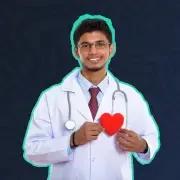Difference Between A Heart Attack And Sudden Cardiac Arrest
In This Article
Difference Between A Heart Attack And Sudden Cardiac Arrest
Alaka
Updated on May 30, 2024
Medically verified by Dr. Arya
Fact checked by Dr. Pournami

Cardiology
10 min read
Have you ever wondered if the terms ‘heart attack’ and ‘sudden cardiac arrest’ indicate the same thing? Well, it's not.
Both the terms can seem interchangeable at the first glance. But they are two different scenarios with specific characteristics and implications. Want to know what both are and how are they different from each other?
Karetrip is here to provide clarity for you on the differences between a heart attack and sudden cardiac arrest. Let’s dive in and find out what are the symptoms of both and how to recognise them.
Heart Attack: What You Should Know?
A heart attack is caused when the blood flow to a part of the heart is blocked.
There will be blockage of an artery or blood vessel that supplies blood to the heart tissue. It can lead to damage or death of the heart muscle tissue.
The main reason for a heart attack is blocked coronary arteries, which is typically brought on by plaque accumulation, which is a combination of fat, cholesterol, and other materials.
This accumulation may cause blood clots to form. It could stop the heart's blood supply.
Common symptoms of heart attack include:
- Chest pain or discomfort in the chest area
- Pain in the upper body
- Nausea or vomiting
- Shortness of breath
- Dizziness or light-headedness
- Cold sweat
There are some risk factors associated with heart attack which can increase the chances of causing the condition. They are:
- Smoking
- Family history
- Diabetes
- High blood pressure
- High cholesterol
- Obesity
- Improper or unhealthy diet
- Inactive lifestyle
During a heart attack, it is critical to seek medical help as soon as possible because fast treatment can reduce heart muscle damage and improve the results.
Treatment options may include medications to dissolve blood clots, procedures to open blocked arteries such as angioplasty and stenting, or surgery. It is important to seek treatment immediately as delayed treatment can cause complications. It can lead to heart failure or even death.
Sudden Cardiac Arrest: What You Should Know?
Sudden cardiac arrest happens suddenly and without any kind of warning. It is a sudden, unexpected loss of heart function, breathing, and consciousness.
It occurs when the electrical system of the heart malfunctions. It causes an irregular heartbeat or arrhythmia that interrupts the pumping action of the heart.
Common symptoms of sudden cardiac arrest include:
- No pulse
- No breath
- Sudden loss of consciousness without any warning
Some of the causes that can lead to sudden cardiac arrest include:
- Arrhythmias or irregular heart beats
- Heart attack
- Heart conditions
- Electrolytes abnormalities
There are certain risk factors or complications associated with sudden cardiac arrest. They are:
- Age
- Gender
- Lifestyle factors
- Previous heart conditions
- Family history
- Some medications
Sudden cardiac arrest often happens suddenly and without warning signs or symptoms, unlike a heart attack. Heart attacks may exhibit warning signs and symptoms.
Sudden cardiac arrest is more dangerous than heart attack and it can happen to healthy individuals as well. They may not even have any known heart conditions.
Thus, the condition requires immediate intervention. Some of the treatments include cardiopulmonary resuscitation (CPR) and the use of an automated external defibrillator (AED). It helps to restore normal heart beat and improve chances of survival.
 9 min
9 min Best Cardiac Hospitals in Bangalore: Heart Care Specialists
 10 min read
10 min read5 Causes Of Heart Failure You Should Know About
 10 min read
10 min readHeart Disease: Important Signs, Symptoms and Types of Heart Problems
Get a Callback Now
Heart Attack And Sudden Cardiac Arrest: Key Differences
A heart attack occurs when there is a blockage in one or more of the coronary arteries, which supply blood to the heart muscle. Sudden cardiac arrest is a sudden loss of heart function caused by an electrical disturbance in the heart that interrupts its rhythm.
Symptoms of a heart attack typically develop gradually and may include chest pain or discomfort, shortness of breath, nausea, sweating, and pain or discomfort in other areas of the upper body.
Sudden cardiac arrest often occurs suddenly and without warning. The affected individual may collapse suddenly, lose consciousness, and stop breathing. There are usually no warning signs or symptoms leading up to sudden cardiac arrest.
Survivors of a heart attack may experience long-term complications such as heart failure, reduced heart function, arrhythmias, or recurrent heart attacks.
To reduce the risk of future cardiovascular events certain measures are recommended. They are rehabilitation, lifestyle modifications, and ongoing medical treatment.
Sudden cardiac arrest is often fatal if not treated immediately. Even with prompt intervention, survival rates can vary.
Survivors may face long-term consequences such as neurological damage, cognitive impairment, or recurrent arrhythmias. Implantable cardioverter-defibrillators (ICDs) may be recommended to reduce its risk in the future.
Understanding the differences between heart attack and sudden cardiac arrest is thus important. It is helpful for recognizing the signs, taking appropriate actions, and improving outcomes for patients.
What Are The Prevention Strategies?
-
Maintain a healthy diet: Eat a balanced diet rich in fruits, vegetables, whole grains, lean proteins, and healthy fats. Limit the intake of saturated fats, trans fats, cholesterol, sodium, and added sugars.
-
Stay physically active: Engage in regular physical activity, such as walking, jogging, swimming, cycling, or other aerobic exercises.
-
Quit smoking: Smoking is a major risk factor for heart disease and increases the risk of heart attacks. Quit smoking habits to increase heart health.
-
Limit alcohol consumption: Avoid alcohol or consume moderately. High alcohol intake can contribute to high blood pressure, obesity, and other heart-related problems.
-
Intake of medications as directed: Follow your doctor's recommendations regarding medications to control blood pressure, cholesterol levels, diabetes, and other underlying conditions.
-
Regular medical check-ups: Visit your doctor regularly for health screenings, including blood pressure checks, cholesterol tests, and assessments of other heart disease risk factors.
-
Educate yourself: Learn about heart-healthy lifestyle habits, risk factors for heart disease, and warning signs of heart attacks and sudden cardiac arrest.
A heart attack is caused when the blood flow to a part of the heart is blocked. There will be blockage of an artery or blood vessel that supplies blood to the heart tissue. It can lead to damage or death of the heart muscle tissue.
Sudden cardiac arrest happens suddenly and without any kind of warning. It is a sudden, unexpected loss of heart function, breathing, and consciousness.
Understanding the differences between heart attack and sudden cardiac arrest is thus important. It is helpful for recognizing the signs, taking appropriate actions, and improving outcomes for patients.
Preventive measures include maintaining a healthy diet, exercising, avoiding smoking and alcohol, taking medications, regular medical checkups, and educating yourself about the conditions.
Source Links
MSD Manual
British Heart Foundation

